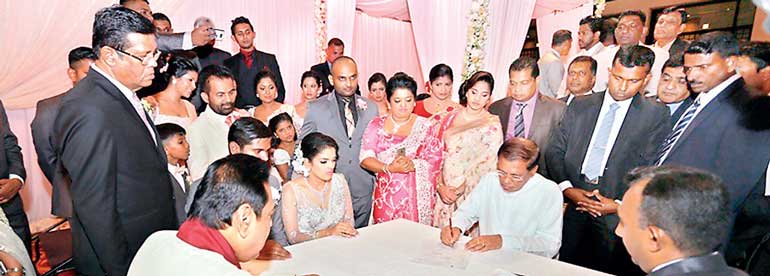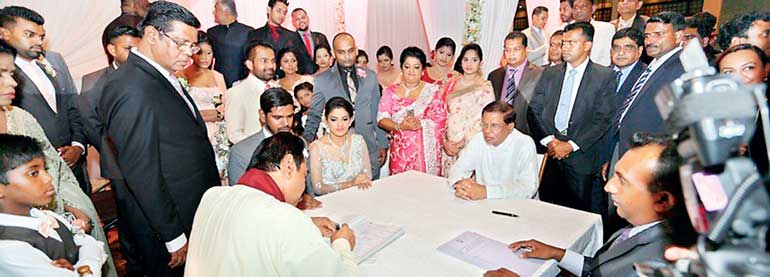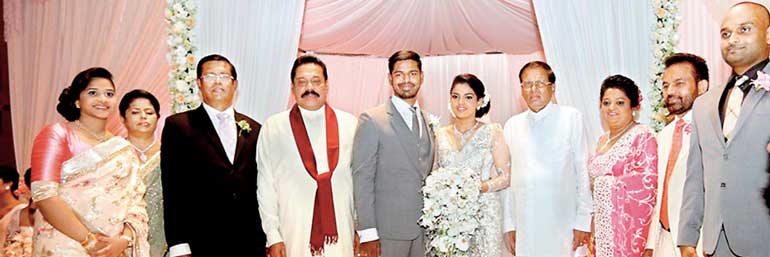Friday Feb 13, 2026
Friday Feb 13, 2026
Thursday, 25 June 2015 00:50 - - {{hitsCtrl.values.hits}}
As President Maithripala Sirisena grows more assertive in the presidency and focuses predominantly on consolidating power within the SLFP, will he continue to allow Mahinda Rajapaksa to dictate the political agenda?

President Maithripala Sirisena and his predecessor Mahinda Rajapaksa signed as witnesses at the wedding of the daughter of prominent gem merchant W. Vinil at the Cinnamon Grand last Thursday
After a disastrous meeting at the Parliamentary Complex in early May, President Maithripala Sirisena and his predecessor Mahinda Rajapaksa had a chance encounter last week, under less official, slightly pleasanter circumstances.
High-profile Kahawatte Gem Merchant W. Vinil invited both politicians to sign as witnesses when his daughter was married at a lavish ceremony at the Cinnamon Grand Hotel in Colombo last Thursday (18).
Both men arrived in their customary national suit, but the ex-President wore a cream-coloured silk version and completed his outfit with emerald studded cuff-links and his signature red shawl. President Sirisena, who arrived a few minutes after his predecessor, wore his regular white tunic and sarong with simple slippers, looking as ordinary and inconspicuous as ever.
But not even the happy occasion and chance social meeting could break the ice between the incumbent and his predecessor, as political tensions continue to simmer six months after Sirisena ousted the Rajapaksa administration in a major election upset.
The two leaders barely acknowledged each other. Video of the registration ceremony showed them sitting across each other and avoiding eye contact. President Rajapaksa was twirling his golden talisman anxiously and repeatedly in his hand. More popularly known as the ex-President’s ‘vashee bole’, the ritual object Mahinda Rajapaksa is always pictured grasping is a vajra, weapon of the God Indra in Hindu mythology, said to symbolise indestructibility and irresistible force.
Soon after the signing ceremony, both politicians posed for a quick picture with the couple and their families at the hotel, before President Sirisena rushed off since he had a second wedding to sign at 20 minutes later. President Rajapaksa mingled for about 40 minutes, posed for selfies with several eager supporters before leaving the function.
Guests at the ceremony would later remark at the contrast between these two men and erstwhile political colleagues. President Rajapaksa, who built a powerful old-fashioned personality cult during his nine- year presidency, looked adorned and showy, with his multiple rings to ward off evil, his dressy tunic and slicked back hair.
“He was like a peacock, while President Sirisena looked the way he always looks, like a simple man of simple tastes – completely ordinary,” said one guest at the function, speaking on condition of anonymity.
Since his election on 8 January, President Sirisena has worked hard to cultivate this image of the ‘simple’ man. Quiet and unobtrusive in how he has wielded the perks of his office and careful about the inconvenience caused by the large security contingent that is his entitlement, President Sirisena rarely makes an entrance. He has been caught on camera strolling into a shop to pick out his own shoes or seated on a chair.

Another popular picture shows the President seated on a cane arm chair in a corner and tucking into a plate of rice. For nearly 10 years, Mahinda Rajapaksa strutted the political stage ‘peacock’ style. Images of his smiling, mustachioed visage or life-sized cut-outs peppered the streets right across the island. The arrogance of his security detail and those of his extended family became frequent irritants on the roads and at public events.
Even six months after his defeat, the Rajapaksa spectre looms larger than life and old habits die hard. Rajapaksa aides and security officers frequently refer to him as “the President” in conversation with media personnel and other members of the public, creating a degree of confusion.
Still popular
The result is that even after several months in the presidency, Maithripala Sirisena’s unobtrusive style is still a breath of fresh air. Signs of frustration against the minority UNP-led Government have begun to emerge, but President Sirisena remains as popular as ever.
The Central Bank bond issue – a major scandal that has seriously eroded public faith in the UNP – has barely touched the presidency. The slow pace of corruption investigations against top members of the former regime, looming economic crises and everyday frustrations against incumbency are almost entirely directed at the UNP and Prime Minister Ranil Wickremesinghe.
Meanwhile, President Sirisena continues to be credited with every major success of the 100-day Government, including the passage of the 19th Amendment, reconciliation efforts and changes in the climate for free expression and assembly.
It is a curious phenomenon that public perception strongly absolves the President from every Government failure. The perception is reinforced by the SLFP, now performing the dual roles of Opposition and Government stakeholders, which heaps condemnation upon the UNP Government but leaves President Sirisena, its party leader, largely untouched.
Six months after his election, therefore, President Sirisena remains untainted, still the paragon of virtue, his legacy intact and  protected thus far.
protected thus far.
This peculiar turn of events is causing deep concern within the UNP, especially after President Sirisena said he would strive to establish a Government led by the SLFP during a rally in Nuwara Eliya last weekend.
UNP concerns
With the President’s popularity at its zenith and the memory of his triumph against the Rajapaksa regime in January still fresh, Prime Minister Ranil Wickremesinghe and other senior UNP members are concerned that he will actively campaign on SLFP stages during the general election campaign.
This will place floating voters who strongly support President Sirisena with an impossible choice. While the SLFP has lost credibility and continues to be identified with the corruption and nepotism of the previous regime, the presence of President Sirisena on the party’s campaign trail could remove some of that stigma.
The steps taken by his administration to advance reconciliation efforts and build bridges with the Tamil and Muslim communities could also restore a share of the minority vote base to the SLFP, which has seen a major loss of non-Sinhala Buddhist support, particularly due to the ultra-nationalist policies of the Rajapaksa administration.
From the President’s perspective, he can only ensure his faction of the SLFP comes in first or at least a close second to the Wickremesinghe-led UNP, if he campaigns strongly in their corner. Yet to do so would be to renege on a major promise to the UNP and the common opposition that strongly backed his candidacy in the January presidential poll. It was an agreement reached between the candidate and the main political party backing his candidature that during the parliamentary election, President Sirisena would play the role of umpire. He would not enter the campaign fray, allowing the two major parties to battle it out for supremacy in the next Parliament.
Instead, as a one-term President, he would focus on overseeing the independent commissions tasked with the de-politicisation of the electoral process and ensure they remained strong and unbiased. Yet as the trust deficit grows between the UNP and the SLFP President they helped to sweep into office, it appears increasingly likely that President Sirisena will not only actively participate in his party’s election campaign, but he may also declare elections only when it is political more advantageous for the SLFP.
Trust deficit
Suspicions that factions of the UNP are actively encouraging the Mahinda faction of the SLFP to contest the election as a separate front are helping the President to justify his decision to throw in his lot with the SLFP.
Close aides of President Sirisena acknowledge that he remains worried, disturbed and deeply sceptical of the UNP. For months after the election, President Sirisena repeated the mantra that it was the UNP voter that had thrust him into the president’s office. Yet last week when a senior UNP delegation comprising Minister Karu Jayasuriya, Kabir Hashim, Lakshman Kiriella, Ravi Karunanayake and former party chairman Malik Samarawickrema met President Sirisena at the Presidential Secretariat and reiterated that the UNP had played a major role in wining him the presidency, the President shot back that he had also played his part in the election. If the UNP was listening, the remarks should have set off alarm bells and indicated that all was not well in the relationship between the President and his minority Government.
In meetings with associates this week, President Sirisena issued sarcastic remarks about the UNP, seemingly irked by repeated statements by members of that party that Maithripala Sirisena sat in the office of the presidency because of the UNP.
While partially true, because the UNP bloc vote propelled President Sirisena to office in January, it also remains a fact that the Grand Old Party could not command a single candidate from within its ranks capable of challenging and defeating President Rajapaksa. Prime Minister Wickremesinghe is being strongly advised by aides and advisors to warn junior UNP members against directly attacking the President, since the remarks were contributing to the overall breakdown of trust between the UNP and the presidency. 
As he continues to try to consolidate support within the SLFP, President Sirisena also appears to be discarding other factions that strongly supported his election campaign in January, sources close to the Government claim.
Last weekend, President Sirisena failed to attend a Pivituru Hetak meeting at the Sugathadasa Stadium, citing bad weather in Nuwara Eliya that was preventing him from flying to Colombo. Prime Minister Wickremesinghe, who was in Kalpitiya at meetings that day, attended the meeting for 30 minutes. Chatura Senanayake, son of Minister Rajitha Senaratne, is a key member of the Pivithuru Hetak movement founded by JHU monk Athuraliye Rathana Thero. Despite his close association with Minister Senaratne, President Sirisena may have had a falling out with his son, highly placed sources told Daily FT.
These sources claim that it also appears that former President Chandrika Kumaratunga has also taken a backseat in governance matters in the recent past. When he was new to the office, President Sirisena placed great value on counsel provided by the former President on various matters.
JHU influences
Similarly in the hasty gazetting of the 20th Amendment to the Constitution, proposing reforms to the electoral system, President Sirisena acted against the counsel of his constitutional advisors, drafting the problem-ridden legislation with the support of the Legal Draftsman and a prominent JHU activist.
The JHU is strongly backing the electoral reforms in their current form, even though they will strongly disadvantage the party except in key ultra-Sinhala Buddhist constituencies. Minister Champika Ranawaka and the JHU continue to wield considerable influence over the Sirisena presidency, with Ranawaka even named as the President’s nominee on the Constitutional Council.
Concerns are being expressed by sections of the Muslim and Tamil communities about the JHU leading the charge on electoral reform that would greatly disadvantage political representation for ethnic and religious minority groups in the country.
Six months after assuming office, President Sirisena is no more the tentative politician he was in January, aides say. He is firmer now in his decisions and more confident in the power he wields. Put down throughout his election campaign for the presidency and after assuming office as being a puppet manipulated by former President Kumaratunga and Prime Minister Ranil Wickremesinghe, President Sirisena is disproving his critics by taking complete control.
The dissolution of Parliament, long anticipated to take place overnight on Wednesday, could be delayed further, as President Sirisena appears to be making the choice to consolidate his power within the SLFP before declaring the polls.
As he flexes his presidential muscle and strikes out independently, President Sirisena also appears to be building links with certain corporate entities strongly alleged to be associated with the former regime’s corruption and manipulation of the financial system.
After the Prime Minister openly criticised high net worth investor Dilith Jayaweera for his role in the stock market scandals when the Rajapaksa regime was in power, President Sirisena will preside over the opening of his latest venture on Friday (26).
The President also awarded television frequencies without auction to a private broadcaster strongly critical of Prime Minister Wickremesinghe. The proprietor of the broadcasting company has been actively cultivating links with the President, while continuing to take an antagonistic line towards his Prime Minister.
Leaked manifesto
In each of these presidential calculations, one factor remains constant. President Sirisena’s every political move is determined by the continued role Mahinda Rajapaksa plays in Sri Lankan politics. As the country gears for a parliamentary poll, the Rajapaksa campaign machinery is kicking into gear.
The Mahinda faction is prepared to contest independently of the SLFP. The faction is ready with a new party and symbol, if elections are announced in the near future. This week, copies of a proposed Mahinda Rajapaksa manifesto for the 2015 parliamentary election were leaked, featuring the slogans – ‘A modern state –A free nation – A harmonious society’. The leaked manifesto features a special message from Mahinda Rajapaksa on its final page, and takes the current Government to task for financial mismanagement and squandering the war-victory. It also features a large section on reconciliation and religious harmony, after research conducted by the Mahinda faction a few months ago revealed his electoral weaknesses in minority strongholds.
For President Sirisena, the re-entry of the Rajapaksas into positions of power with fresh mandates from the people will be a frightening prospect. Security threats against the President persist and Rajapaksa circles are buzzing with confidence about Mahinda Rajapaksa’s eventual ascent to the presidency by 2016.
Politically, if the former President enters parliament with a significant majority, he could potentially scuttle the Sirisena administration’s reform agenda and undermine the new President’s hold over the SLFP.
Electorally, with a majority of the SLFP now backing a Rajapaksa return, President Sirisena appears strongly fearful that the SLFP faction he leads will poll third in the parliamentary race, behind the UNP and also the Mahinda faction of the party.
This will not only be intensely embarrassing for President Sirisena, but it will also cast doubts upon his mandate and the presidential legacy he is striving to craft. To prevent the Rajapaksa return at all costs is President Sirisena’s fundamental preoccupation. If abandoning the UNP and reneging on some of his presidential election pledges is the price he has to pay to prevent Mahinda Rajapaksa’s comeback, it is increasingly apparent that he is willing to make the sacrifice.
Transformation
Slowly but surely then, President Sirisena is making the transformation from lilywhite statesman to partisan, expedient politician. This should come as no great shocker.
The executive presidency has a way of corrupting the seemingly incorruptible. Maithripala Sirisena is a mere mortal. As President, he faces an existential threat from his predecessor. Exercising his prerogative on dissolution and the full powers of his office may prove his only hope to neutralise this threat. But unlike all the other problems facing the so called 100-day Government, the delay in dissolving Parliament and allowing the current political instability to persist falls squarely on the President’s shoulders.
From this there is no escape, as civil society groups and political parties that strongly supported his candidacy for President take to the streets demanding that he end the term of the present legislature.
When he decided to run for President, Maithripala Sirisena had a singular goal. That goal was the defeat of Mahinda Rajapaksa and the dismantling of his regime. Six months later, Mahinda Rajapaksa remains the President’s primary preoccupation, surpassing even the need to enact and implement far-reaching policy reform that would ultimately strengthen democracy and create a civic consciousness that would prevent a return to authoritarianism in the near term.
As the politician that fought and won against the mighty Rajapaksa juggernaut, it will be a tragedy if Maithripala Sirisena continues to allow Mahinda Rajapaksa to dictate the agenda during his presidency.
